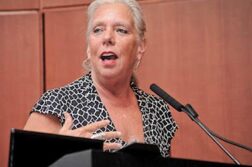The past year saw an especially large number of deaths of notable lesbians and gay men, including many prominent artists and writers. The following list, while clearly not exhaustive, mentions some of people who passed away and highlights their accomplishments.
Leslie Cheung Kwok-wing. The 46-year-old Hong Kong pop singer and actor leapt to his death on April 1. Educated at Leeds University in Northern England, he was one of only a few Asian stars to play openly gay roles. His successful pop singing career paved the way for film roles, and he debuted in a John Woo action film in 1986. He was perhaps best known among mainstream American audiences for his role as Cheng Dieyi in 1993’s Farewell, My Concubine. He left as corpus of sixty films and was one of Hong Kong’s most popular performers.
John C. Graves, physicist, psychotherapist, and philanthropist, died of heart failure on October 13 at age 65. Graves was the founder of Fort Lauderdale’s Stonewall Library and Archives at the Gay & Lesbian Community Center of South Florida, which now has more than 10,000 books of gay and lesbian materials and is the third largest gay archive in the U.S. Graves, originally a physicist, received a doctorate in philosophy and taught the philosophy of science at MIT. He founded the Gay Academic Union of New England in 1974. His self-published autobiography, Many Roads Traveled, was reviewed in this journal in 2001.
Alexander Grilikhes. The lesbian poet, writer, and teacher died of breast cancer on February 8 at age 70. Her novel Yin Fire was published in 2001 by Haworth Press. She was Director of the University of Pennsylvania’s Annenberg School of Communications Library for close to thirty years, and for twelve years was editor and publisher of a literary journal, American Writing: A Magazine, which ceased publishing in 2002. She also hosted literary radio programs in Philadelphia.
Thomas Grimes, a Boston-based actor, poet, filmmaker, singer, songwriter, and director, died at age 45 on March 11 after suffering chest pains. He was named “father of black gay and lesbian theatre in Boston” for his choreodrama, Through the Fire. His poetry was widely published and anthologized, and he cofounded the Writers of Color Workshop as well as the New African Theatre Company. In New York City, he worked with the Negro Ensemble Company and the Nuyorican Café. He won the 1994 Robert M. Bennett Award from the American Film Institute for his docudrama Allegations.
George Haimsohn, who co-wrote the book and lyrics for the play Dames at Sea, died on January 17 of an aneurysm at the age of 77 in Greenwich Village, where he had lived since 1952. Notable for launching Bernadette Peters’s acting career, Dames at Sea, a spoof on Busby Berkeley spectacles, opened at the Bouwerie Lane Theater in 1968 and has since been revived in hundreds of productions worldwide. Haimsohn also wrote the book and lyrics for Now, Zing and Johnny American and, under the name of Alexander Goodman, wrote gay pornography. Using the pseudonym Plato, he became well-known as a photographer.
Lou Harrison, a composer of serious music, died of a heart attack at a roadside restaurant in Indiana on February 2 at age 85. He was en route to a festival of his music at Ohio State University. Harrison wrote over 300 musical works, built and designed musical instruments, and was a poet and calligrapher. He collaborated on ballets with choreographer Mark Morris. Harrison was influenced by the music of Java, Taiwan, and South Korea and is credited with founding the American gamelan movement, of which there are now some 200 ensembles. Harrison was well-loved and openly gay virtually all his life. He sought peace and brotherhood, writing some of his works in Esperanto. He also wrote music criticism, and in 1947 conducted the first performance of a complete symphony by Charles Ives. He was named composer of the year 2002 by Musical America, a music service organization.
Pepper LaBeija, one of the stars of the 1991 documentary Paris Is Burning, died on May 26 of a heart attack at age 53. Born William Jackson, she was the last of the four great queens of modern Harlem drag balls. These events were commenced in 1960 to give gay blacks and Hispanics a place to dress up and perform, and drew attendees from all strata of society. Trophies were awarded in a variety of categories. Miss LaBeija won 250 trophies for her designs in high fashion.
Jed Mattes, a literary agent and gay rights activist, died of cancer on July 24. He began his career with International Creative Management, where he represented a number of gay authors, including Armistead Maupin. In 1989 Mattes formed his own company in Manhattan, handling fiction, nonfiction, film, and TV rights. There he represented a “who’s who” of gay and lesbian authors, including Michelangelo Signorile, Betty Berzon, Urvashi Vaid, Gabriel Rotello, Eric Marcus, and Chris Bull. He was a trustee of the Hetrick-Martin Institute for the Protection of Gay and Lesbian Youth, and had lived in New York City since 1970.
Sarah Pettitt, a founding editor and later editor-in-chief of OUT magazine, died of non-Hodgkin’s lymphoma on January 22 at the age of 36. At the time of her death she was senior editor of the Arts and Entertainment section of Newsweek magazine. Following her graduation from Yale, Pettitt began her career in 1989 as Arts editor at New York’s OutWeek magazine until it folded in 1991. She was, as Curve magazine noted, “widely remembered as one of the most influential lesbian journalists of our time,” and was a frequent guest on television news programs. She is remembered by former colleagues as an outspoken, ambitious and brilliant woman who was not afraid to tackle controversial topics such as AIDS activism and “outing.”
Herb Ritts. At the beginning of 2003, news was received of the death on December 26 of the renowned photographer, who was 50. The cause of his death, revealed several months later, was AIDS-related pneumonia. Famed for his photographs glorifying the male body and mythologizing celebrities, his subjects ranged from supermodels to politicians, from Madonna to the Dalai Lama. Ritts’s late 1970’s photos of his friend Richard Gere initially brought him to the public’s attention. Ritts contributed to Vogue magazine for over fifteen years.
C. A. (Clarence Arthur) Tripp, who died of cancer on May 22 at age 83, was best known for his 1975 book The Homosexual Matrix, which sought to dispel misconceptions about homosexuality and was arguably the most influential book on the subject in the post-Stonewall era, selling nearly half a million copies. Tripp worked with Alfred Kinsey and received a doctorate in clinical psychology. He maintained a private practice and taught at the State University of New York–Downstate for nine years. At the time of his death he had just completed, with the help of Lewis Gannett, a literary editor for this journal, a new book about Abraham Lincoln’s homosexuality.
Monique Wittig. The French-born lesbian writer died of a heart attack on January 3 at the age of 67. Reviewer Sally Beauman, writing in the New York Times Book Review, called her 1969 work, Les guérillères (“the guerrillas”), “perhaps the first epic celebration of women ever written.” A mixture of poetry and prose, the work was set in a utopian Amazonian society. Her most recent work, The Straight Mind and Other Essays (1992) compared lesbians to fugitive slaves. In 2001, her film The Girl (based on one of her short stories) was released, and the New York Post called it “the steamiest lesbian romp in memory.” At the time of her death, Monique Wittig was living in Manhattan and Tucson, where she had taught at University of Arizona since 1990.




